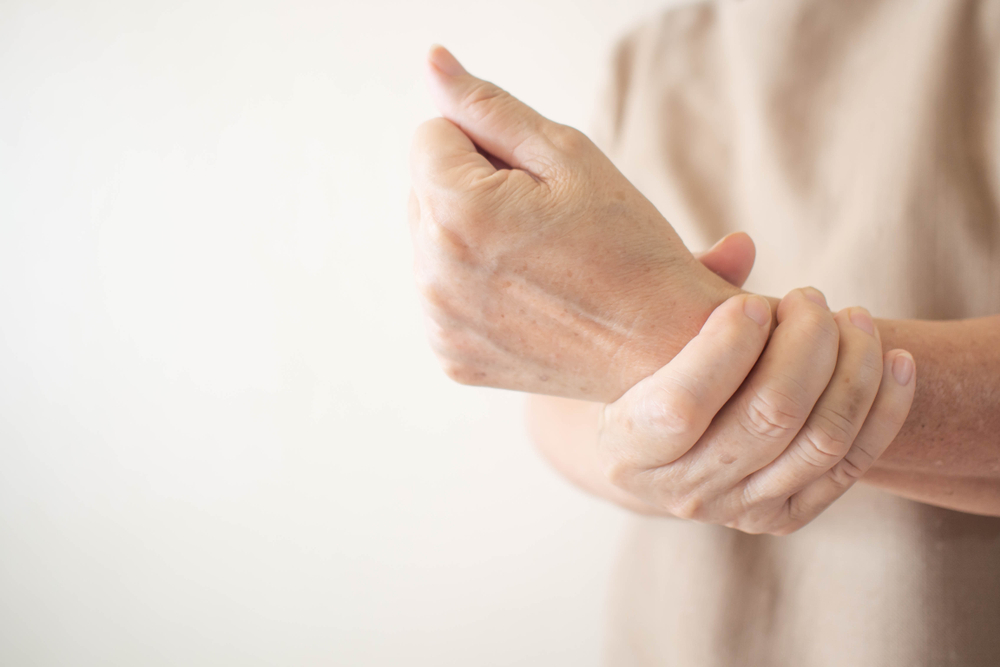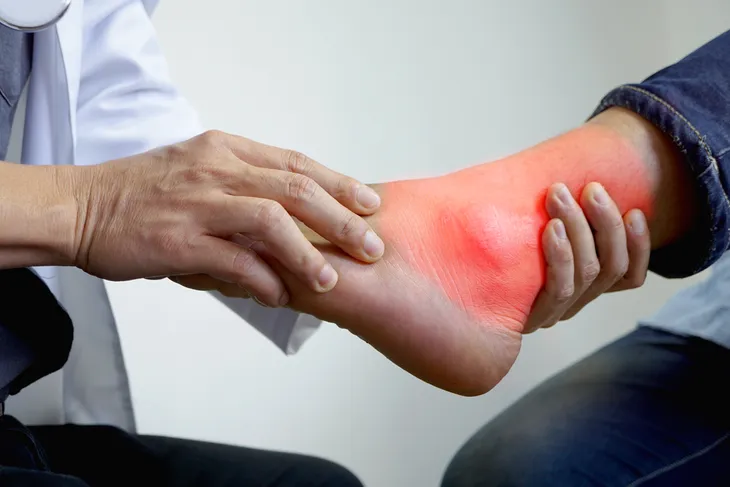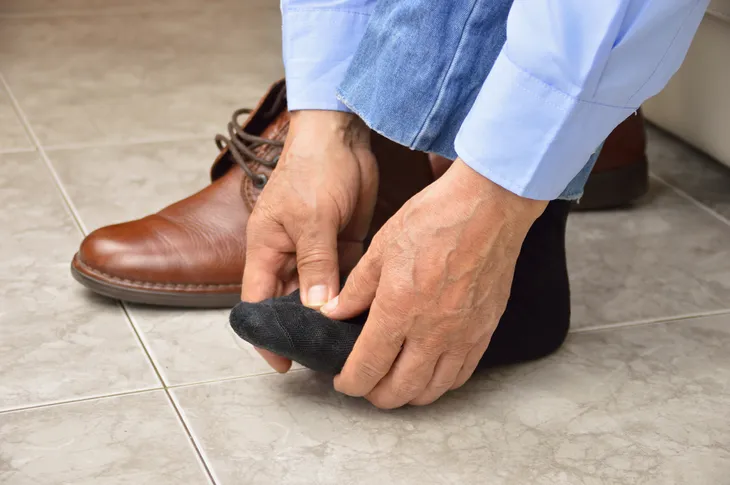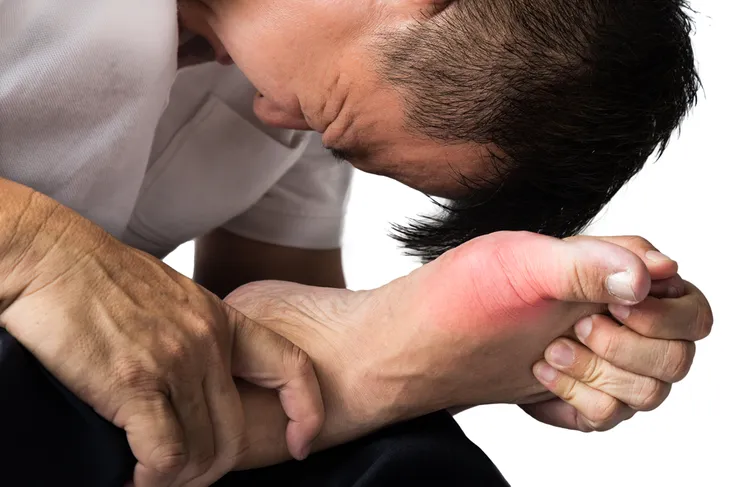Gout is a painful form of inflammatory arthritis that develops in the joints. It usually occurs in the big toe with other common places being the fingers, knee, and wrist. It’s a result of high uric acid levels in the blood. Uric acid forms into small crystals within the joints causing abrupt, sharp pain. These gout attacks normally happen at night when you least expect it.
The symptoms of gout are pain, swelling, and redness in the joint. It can hurt and be difficult to move the joint during an attack. The pain can increase over the first 12-hours, with the gout attack typically lasting seven to 10 days. The Arthritis Foundation tells us that 6 million men and 2 million women in American will experience a gout attack. With 60-percent of those who have had a gout attack will have a second one within a year.
1. Anti-Inflammatory Medications
If you are experiencing the pain and swelling from a gout attack one of the first things you should do is take a nonsteroidal anti-inflammatory (NSAID) medication like ibuprofen or naproxen. These NSAIDs should shorten the length of the gout attack and help manage the pain. You’ll see the best results if you take them within the first 24-hours says the Arthritis Foundation.
Your doctor may suggest a prescription anti-inflammatory medication for your gout called a corticosteroid. This medication is a strong anti-inflammatory drug that reduces pain and swelling. It is available as both an oral or injection medication. According to the Arthritis Foundation, another medication called adrenocorticotropic hormone (ACTH) can stimulate “…the body to produce corticosteroids naturally, can help treat a gout attack.”
2. Prescription Medications
During a gout attack, the body has increased levels of uric acid. Thankfully, there are prescription medications that reduce uric acid levels to prevent the development of chronic gout. Since these medications can worsen or prolong a gout attack your doctor will prescribe it once your gout attack has subsided says the Arthritis Foundation. Compliance with these medications can be difficult, as they cause the uric levels in the body to decrease which can initially start another gout attack. However, if you take the drugs continuously, they will prevent future attacks.
The most common prescription medications for gout are allopurinol, febuxostat, probenecid, and pegloticase. Each one of these drugs works a little differently and has its own side effects. You and your doctor will need to discuss which one is best suited for your situation.
3. Drink Water
During a gout attack, it is incredibly important to drink water to lower your uric acid levels. Water and other fluids help keep your body hydrated and flush the uric acid from your system. On top of that, drinking lots of water will help to prevent kidney stones which can also happen with high uric acid levels.
According to the Arthritis Foundation, you should try to drink eight to 16-cups of water every day. If you have trouble remembering to drink water, make a plan to drink at certain points during the day or even set an alarm on your phone as a reminder. You could also try purchasing a new, fun water bottle which could act as an incentive to gulp down more cups of water.
4. Cold Therapy
Icing your joints during a gout attack can help lessen the pain and swelling. The cold will temporarily reduce pain by numbing the area and interrupting the pain pathway. It will also diminish swelling through vasoconstriction, which is the tightening up of blood vessels, decreasing blood flow.
Apply an ice pack to the painful area for 20- to 30-minutes at a time, multiple times a day. Don’t apply the ice pack directly onto your skin, wrap it up in a light towel first. WebMD recommends avoiding placing ice on your hands and feet if you suffer from nerve conditions like diabetes.
5. Talk to Your Doctor
You don’t have to manage your gout attack alone! Place a call to your doctor and make an appointment. If this is your first gout attack it is important to have an accurate diagnosis as soon as possible to receive the right treatment. And if you suffer from chronic gout follow your doctor’s orders regarding treatment.
If this isn’t your first gout attack keep an eye on your symptoms. Other conditions like joint infections have the same signs and symptoms as a gout attack. If you have a high fever, chills, or your symptoms don’t subside after 48-hours, call your doctor. Your doctor may be able to make a change to your medication, says WebMD. Typically, quick treatment can reduce the severity and duration of the attack.
6. Stay Away from Alcohol
After a long week, it can be tempting to have a drink to relax, especially if you’re in pain from a gout flare-up. Unfortunately, alcohol contains purines, which form uric acid. Healthline tells us that, “when uric acid isn’t flushed out of the body properly, it can build up and create crystals. These crystals most commonly form in the kidneys and around the joints, causing pain and inflammation.”
If you’re experiencing a gout flare-up, you’ll need to avoid alcohol in order to lower your uric acid levels. Instead of drinking a beer, drink plenty of water to help flush the uric acid out of your body. Once the gout flare-up has subsided, it is best to continue to avoid alcohol as it is a gout trigger for some people.
7. Rest and Relaxation
During a gout attack, you need to take it easy and rest. You probably won’t want to get out of bed anyway. The Arthritis Foundation tells us that stress can exacerbate gout symptoms. So you don’t have to feel bad about resting in your bed and watching movies until you feel better.
Some people can have a hard time resting and letting go of all the things that need to get done. For your joint’s sake, take time off to let your body heal. Find a relaxing activity that you can do at home, watch a TV series that you’ve always wanted to see, or finally read that book that you haven’t gotten to. Do whatever it takes to make your health the priority.
8. Elevate
If your joint is swollen during your gout attack try raising it on a pillow to reduce swelling. Elevating swollen feet, arms, or whatever is bothering you will help the venous return, or the blood flow back to your heart. This combined with less fluid in your tissues should help with both the pain and swelling.
You’ll get the best results if you combine elevating your joint with other gout treatments that we’ve talked about, like NSAIDs, ice, and rest. When all these treatments are used together, you should have less pain, swelling, and hopefully be back to your old self faster.
9. Remove Irritating Clothes
Even clothes can be painful on a gouty joint. If you have gout in your toe don’t wear socks or cut off the toe section from your socks, suggests Arthritis Foundation. Just the pressure from your sock can be painful.
When you are in bed the weight from your sheets and blankets can also be painful. Try to fold your sheet up from the foot of your bed if you need your blanket to sleep. Remember to take a pain reliever to improve your comfort and let your doctor know if the pain doesn’t get better or gets worse.
10. Use Walking Assistive Devices
Just like pressure from clothes can be painful during a gout attack, walking can hurt too. Use a cane or walker to help take the pressure off of your feet (if that’s where your gout is bothering you). Less pressure on your feet can also help reduce swelling that is common with gout.
One of the largest pieces of gout management is lessening pain. Using a cane, resting, ice, elevating your feet and taking medication are all ways to reduce pain. As we’ve said before, drinking plenty of water and taking any prescription medications ordered by your doctor can help diminish the length of the gout attack.
11. Ask for Help
This tip might be the hardest one for many people to follow. When you’re in the midst of a gout flare-up it can be too painful to work, run errands, buy groceries, and take care of your family. You’re going to need help and don’t be ashamed to ask.
If you have family or friends in the area reach out to them for help. Being sick is hard, especially if you don’t have a support system in place. Your doctor can refer you to a social worker if you need additional support. A social worker can help you take advantage of public programs and services for people in need.
12. Preventing a Future Gout Attack
A gout attack can be a signal that you need to change your lifestyle and adopt some new healthy habits. Eating healthy and losing weight can lessen your chances of having future attacks. The more weight you carry the more uric acid you have in your body, reports WebMD. Red meat, seafood, high-fat foods, alcohol, and sugar are known gout triggers and should be avoided.
Gout is linked to many other conditions like, “high blood pressure, diabetes, metabolic syndrome, heart disease, and kidney disease,” according to WebMD. Talk to your doctor about ways you can prevent a gout attack with medication and managing any pre-existing conditions you have. Thankfully, gout can be easily managed once you find your triggers and have the right medications on board.















